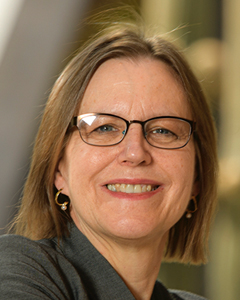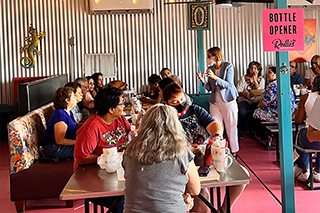October 11, 2023

NIEHS grant recipient Joann Sweasy, Ph.D., professor of cellular and molecular medicine at the University of Arizona, was in elementary school when heartbreak struck: She lost her 5-year-old cousin, to whom she was devoted, to leukemia.
“When my cousin died, I wanted to turn this tragedy into something impactful,” recalled Sweasy. “I was drawn to science from a young age, and I turned to science in the wake of this. I wanted to help people.”
A first-generation college student, Sweasy earned her undergraduate degree in biology and chemistry before landing a job with the pharmaceutical company Merck. There, she was part of a team that developed antibiotics to treat bacterial and parasitic infections.
When Sweasy began a Ph.D. program at Rutgers University, her mentors at Merck suggested she take classes with the late Evelyn Witkin, Ph.D., a geneticist known for pioneering research on DNA mutagenesis and repair. From the first lecture, Sweasy was captivated by the topic and Witkin’s unique take. Under Witkin’s mentorship, she began a long career in genetic research.
Now, as a 2020 awardee of the prestigious NIEHS Revolutionizing Innovative, Visionary Environmental Health Research (RIVER) grant, she is conducting pioneering research on DNA mutagenesis and repair that could provide benefits for thousands of people coping with the autoimmune disease lupus.
From Cancer to Lupus
Sweasy, an NIEHS grant recipient since 2000, largely studied cancer until a surprising finding shifted her research interests.
Her team had been exploring the role of DNA polymerase beta, a protein involved in DNA repair. Genetic variations in DNA polymerase beta can contribute to genome instability — a tendency toward mutation and hallmark of cancer. The researchers had bred mice with DNA polymerase beta gene variants that were strongly linked to genome instability. They hypothesized that the rodents would spontaneously develop cancer.
But the mice never did.
“Instead, they had skin lesions, kidney disease, and autoantibodies, which are immune proteins that target a person’s own tissues,” Sweasy explained.
She showed her results to a colleague specializing in skin conditions, who noted that the mice’s symptoms resembled those of lupus — an inflammatory autoimmune disease caused by the immune system attacking healthy cells. This unexpected result indicated that abnormal DNA repair mechanisms were somehow linked to autoimmunity.
“This was a really serendipitous discovery,” said Sweasy. “I had been studying genes and cancer, but this turned out to be a whole new opportunity to explore aberrant DNA repair and autoimmunity.”
Testing DNA Repair Variants in Mice
Sweasy’s RIVER award builds on that discovery, focusing on why faulty DNA repair may lead to lupus.
In collaboration with Lindsey Criswell, M.D., Ph.D., Sweasy and team have identified several DNA repair variants that were present in higher numbers in people with lupus. Then they bred mice with these variants to examine how environmental exposures affected the rodents.
“We don’t know the mechanism, but it looks like these genes act in different ways, in different tissues, in ways that may not be related directly to DNA repair,” said Sweasy. “And maybe some of these variants, in combination with exposure to sunlight or air pollution, will lead to development of lupus symptoms.” (Published research on this work is forthcoming.)
Further research may provide more insight into underlying gene-environment interactions, which are challenging to understand, according to Sweasy.
“Having RIVER funding has allowed us to explore that gene-environment interaction space to do some impactful work,” she said.
Before starting this work, Sweasy had limited experience with immunobiology. She has since immersed herself in the field and credits colleagues — many NIEHS grant recipients among them — for providing invaluable expertise.
“There’s a steep learning curve. I work with a lot of incredible scientists to learn about immunology and autoimmunity,” Sweasy said. “It’s exciting because it doesn’t allow me to stagnate. It keeps me on my toes.”
Better Care for Lupus Patients

Sweasy (standing, right) explains her research on gene-environment interactions to community members from South Tucson. She enjoys speaking to communities and learning from them. (Photo courtesy of Joann Sweasy)
Ultimately, Sweasy hopes her work will lead to improved therapeutic or preventive approaches for lupus, including identifying potential drugs targets. Over 200,000 Americans have lupus, and nine out of 10 are women. The disease also disproportionately affects people of color. Sweasy noted that there are no new treatments in the pipeline.
“Lupus hasn’t been on the radar screen for a lot of funding agencies,” she said.
Several years ago, Sweasy attended a conference on lupus and met individuals who have the disease. The experience profoundly affected her.
“It’s all about the patient in the end,” she said. “I’m hoping that, if we know that individuals with certain DNA repair variants are affected by certain environmental exposures, we can prevent the disease in some way. It’s all about patient benefit. It’s all about patient quality of life.”


